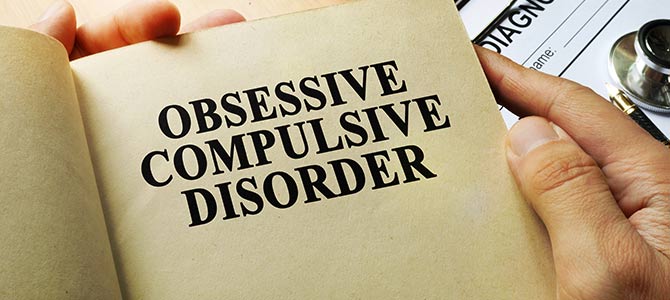Everything You Need To Know About OCD Q&A
Obsessive-compulsive disorder (OCD) is a condition defined by undesirable intrusive thoughts that are followed by emotions of anxiety, uncertainty, and, on occasion, panic. The disorder causes the person to become trapped in a cycle of obsessions and compulsions that affect their thinking and behavior. If these issues are not addressed, they can hurt a person’s personal and professional lives. Seeking care as soon as symptoms develop will help reduce the impact on your life. Our team of professionals at Psychiatry of the Palm Beaches can offer treatment plans that can help you manage your obsessions and compulsions. For more information, contact us today or book an appointment online. Visit Psychiatry of the Palm Beaches serving Jacksonville, Boynton Beach, Palm Beach Gardens, Stuart, Royal Palm Beach, Port St. Lucie, Melbourne, Fort Lauderdale, and Jupiter, FL.




Table of Contents:
What is an OCD person like?
What triggers OCD?
What does high-functioning OCD look like?
What age does OCD peak?
People with obsessive-compulsive disorder experience persistent, intrusive, and distressing thoughts, images, or urges that repeatedly occupy the mind. These are known as obsessions; they are the triggers for anxiety and discomfort. Additionally, OCD is characterized by repetitive behaviors, which are performed to alleviate the distress caused by obsessions. People with OCD often engage in repetitive rituals, such as saying the same phrase multiple times. Some of the most prevalent compulsions associated with OCD include:
• Need for symmetry – Many people with OCD experience the compulsion to arrange or organize items in a specific, symmetrical way.
• Checking – A common compulsion is constantly checking locks, appliances, or switches to ensure they are off or locked. This can cause significant delays in daily routines.
• Fear of contamination – In some cases, people with OCD experience an excessive fear of germs and contamination. This can lead to frequent handwashing and the avoidance of specific places or objects.
• Hoarding – It’s common for people with OCD to collect and keep a large number of possessions, even if they have little or no value.
Overall, OCD can cause people to act in a variety of ways. Obsessions and compulsions can lead to significant distress and interfere with daily functioning, relationships, and general quality of life.
OCD is typically caused by a combination of factors. Some of the most common triggers of OCD include:
• Environmental factors – Trauma, stressful life events, and other significant changes can trigger OCD or worsen existing symptoms.
• Biological factors – Imbalances in certain brain chemicals, like serotonin, can play a role in the development of OCD. Additionally, genetics also have an influence, as the disorder can run in families. Furthermore, abnormalities in brain structure or functioning, particularly in the frontal cortex and basal ganglia, are linked to OCD.
• Learned behavior – Sometimes, learned behaviors and associations contribute to the development of this disorder. For instance, if a person finds that performing a specific action reduces their anxiety, they will continue to do it, reinforcing the compulsion.
• Infections – Research has uncovered that streptococcal infections, such as strep throat, can trigger or worsen OCD symptoms in children. This condition is known as Pediatric Autoimmune Neuropsychiatric Disorders Associated with Streptococcal Infections (PANDAS).
High-functioning obsessive-compulsive disorder is usually not instantly noticeable, as people with this form of the condition often manage their symptoms effectively, which allows them to lead seemingly normal lives. These individuals can excel in their careers, maintain relationships, and continue to pursue their interests.
However, beneath the surface, people with high-functioning OCD grapple with persistent, distressing obsessions and compulsions. It’s common for these people to engage in rituals or behaviors in secret, such as checking locks multiple times or silently repeating phrases. This can significantly drain mental energy, so despite this form of OCD being difficult to notice, it can be mentally exhausting. Those with high-functioning OCD tend to be perfectionists and strive for impeccable performance in their daily tasks. These people are often very meticulous in their work, but this perfectionism can also lead to excessive time spent on activities and difficulty making decisions.
In summary, while high-functioning OCD allows people to hide their struggles from others, it doesn’t diminish their internal distress. Even if you are high-functioning with OCD, it’s recommended to explore options such as cognitive-behavioral therapy to support symptom management and improve your wellness.
OCD is a complex condition that can emerge at any age, but it often exhibits specific patterns in terms of when it tends to peak. Generally, OCD symptoms peak in late adolescence to early adulthood, between the ages of 18 to 24. It’s important to keep in mind that the onset of OCD can occur in childhood, and it’s not limited to any specific age group. While this condition often emerges in the late teens and early twenties, it typically persists into adulthood, leading to lifelong challenges. For this reason, early diagnosis and timely intervention are crucial in managing OCD effectively, regardless of the age of onset.
OCD is a mental health issue that affects people of all ages and walks of life. OCD can be both a mental condition and a neurological condition. Just as a diabetic requires insulin to function normally, OCD patients require medication to function normally. Treatment for OCD is available at Psychiatry of the Palm Beaches to help individuals manage their symptoms and improve their quality of life.
Managing OCD with Compassion at Psychiatry of the Palm Beaches with Ellington
Ellington at Psychiatry of the Palm Beaches provides a compassionate and understanding approach to treating OCD. Recognizing the distress that OCD can cause, Ellington offers supportive care aimed at alleviating symptoms and helping patients regain control. Treatment plans are tailored to fit the specific needs of each patient, ensuring that everyone receives the care they deserve.
For more information, contact us today or book an appointment online. We serve patients from Boynton Beach FL, Delray Beach FL, Palm Beach Gardens FL, Jupiter FL, Stuart FL, Palm City FL, Royal Palm Beach FL, Wellington FL, Citrus Ridge FL, Jacksonville FL, Riverside FL, Port St. Lucie FL, Beau Rivage West FL, Melbourne FL, Palm Bay FL, Fort Lauderdale FL, Hollywood FL, Jupiter FL, North Palm Beach FL, and surrounding areas.
Check Out Our 5 Star Reviews



Additional Services You May Need
▸ Mental Wellness
▸ Relationship Coaching
▸ Depression and Mood Disorders
▸ Women’s Health
▸ Panic Disorder
▸ Medications Management
▸ Men’s Health
▸ Individual Psychotherapy
▸ Bipolar
▸ ADHD
▸ Geriatric Mental Health
▸ Couple’s Counseling
▸ Obsessive Compulsive Disorder
▸ Social Phobia Treatment
▸ Eating Disorders
▸ Post Traumatic Stress Disorder
▸ Psychotic Disorders


